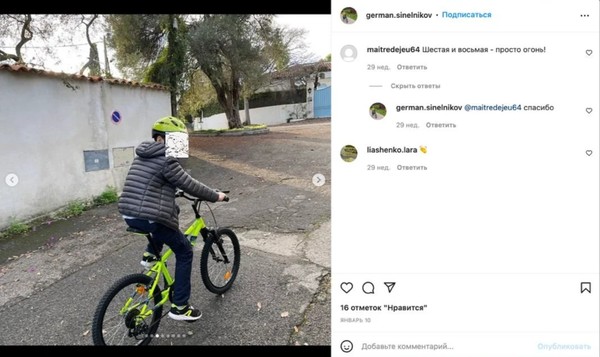
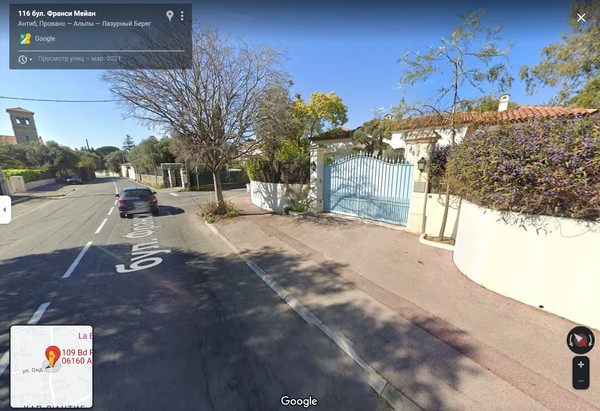
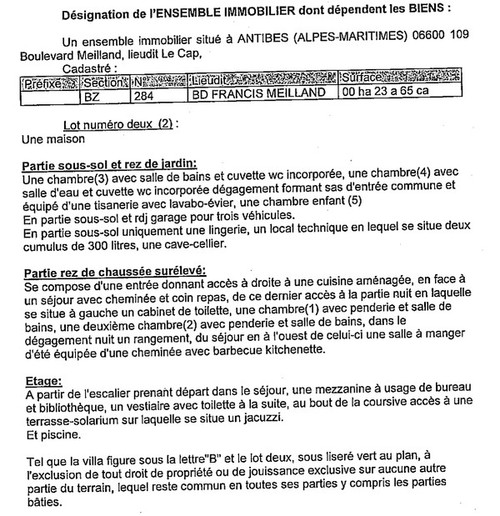
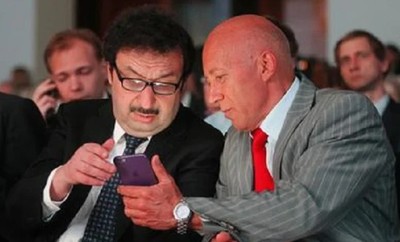
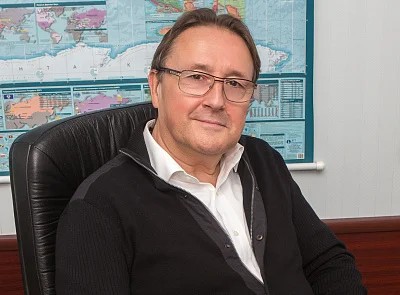

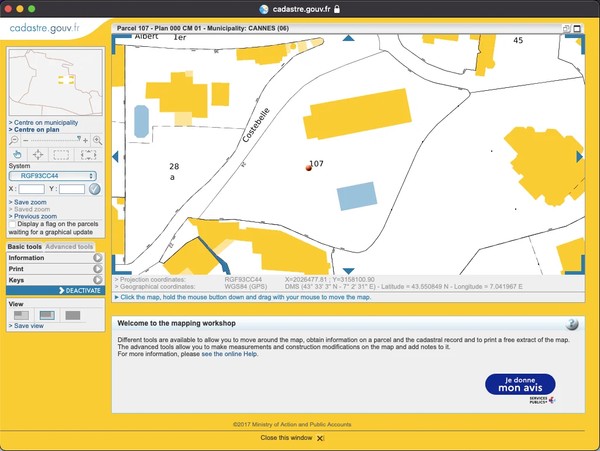




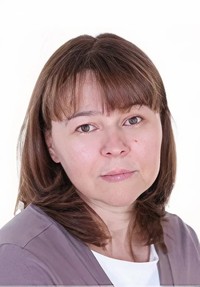


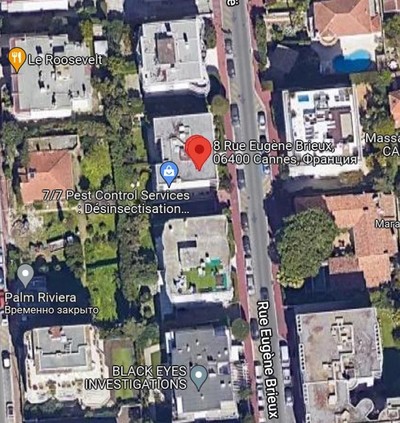
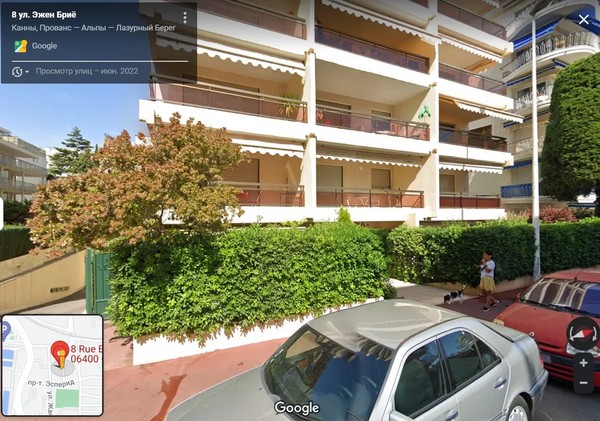
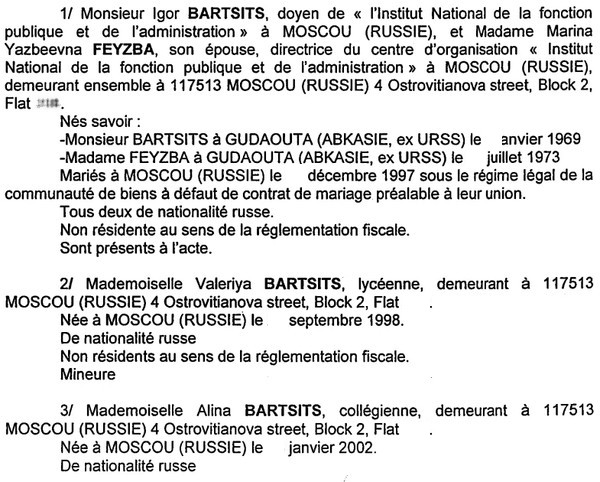
works at RANEPA as an assistant professor at the Institute of Economics, Mathematics and Information Technologies. The couple has a son, Herman.
The large family of the rector of VAVT owns the French company Tanagra, founded in 2012. According to official French registers, she is engaged in real estate transactions, namely, its acquisition and rental. As a rule, this form of ownership of personal real estate – through a company – is optimal in France.
The legal address of this company is the Cote d’Azur in France, in the second largest city in Provence, Antibes, located between Cannes and Nice.
The company is divided between members of the Sinelnikov-Murylev family: one part belongs to the rector himself and his wife Elena, the other to the family of the eldest son, and the third to the youngest son Peter, who was no more than 13 years old at the time of the creation of the company.
At the address indicated in the company’s official documents, there are two private houses where the rector’s grandson Herman spends time in the winter (judging by the photographs from his Instagram profile, which include part of the fence surrounding the house and the blue gate opposite it).



The house, owned by the rector and his family, has several bedrooms, a living room with a fireplace, a summer veranda with a barbecue area, and a solarium terrace. In addition to the good view from the window of the villa and the tropical garden, there is a swimming pool on the territory of the house.

Where does the money come from?
In 2018, Sinelnikov-Murylev, in a conversation with RBC, named science and teaching as the main sources of his income. “I receive about a fifth of my income as rector. The overwhelming majority consists of income from scientific and teaching activities. The remaining small part is interest on bank deposits,” he said.
The money that university leaders call “income from scientific and teaching activities” could be grants paid to them on an equal basis with other scientists, according to those interviewed by Novaya Gazeta. Europe” experts. What are their potential volumes?
“The usual grant from the Russian Science Foundation (RSF) is 6 million rubles per year. He usually [выделяется] for a team of 8-10 people. There are larger grants from the Russian Science Foundation, 10 million a year. One way or another, it is extremely difficult to imagine a citizen who individually receives more than 2 million rubles a year from RSF grants, says Doctor of Physical and Mathematical Sciences, Chief Researcher at the ITF. Landau Mikhail Feigelman. — The highest paid Skoltech professors can have a salary of up to 10 million rubles per year (and this is an order of magnitude higher than other relatively high salaries in science in the Russian Federation). The statement about 50 million a year for “research and teaching activities” is an obvious example of super-arrogance and impunity.”
According to the official report of the Russian Science Foundation (RSF), in 2021 it financed about 5,300 projects and programs worth 24.3 billion rubles. On average, 4.6 million rubles were spent on one program or project. If we count in per capita terms, then the Russian Science Foundation supported 39.6 thousand scientists. It turns out that about 600 thousand rubles were spent on one scientist per year. This is not much if you subtract taxes, administrative costs and consumables.
RSF projects and programs are distributed across 582 organizations. Individual grants could be quite large. Thus, in past years, through the competition “Implementation of complex scientific programs of organizations,” it was possible to receive a grant from 50 to 150 million rubles per organization.
According to the official report of the Russian Foundation for Basic Research (RFBR) for 2021, the total amount of funds received by the RFBR amounted to 19.5 billion rubles, and almost all of this amount came from the state budget. Of this, approximately 15 billion rubles were allocated for grant support for science.
At the same time, the average size of a RFBR grant is 1.5 million rubles. The largest grants from the Russian Foundation for Basic Research – in the Mega-Science category – reach an average of 4.5 million rubles. So Rector Sinelnikov’s scientific income is equal to approximately ten Mega-Science grants.
Sergei Sinelnikov-Murylev is indeed a prolific scientist: he has 194 publications in the RSCI, and 69 publications in the RSCI core. Let us recall that the RSCI is a list of journals that can claim the status of at least somewhat scientific, and the core of the RSCI is journals that are considered recognized throughout the world.
According to the RSCI core, Sinelnikov-Murylev’s H-index is 11. This means that Sinelnikov-Murylev has 11 publications in reputable journals, each of which has been cited at least 11 times in other reputable journals. These indicators deserve respect, but such an index does not provide grounds for asserting that Sinelnikov-Murylev is “head and shoulders above” other Russian scientists and therefore earns many times more. For comparison: the Hirsch index of Dissernet co-founder Mikhail Gelfand according to the RSCI core is 56, and professor Konstantin Severinov is 49. Here one can argue that economists cannot be compared with biologists, but in Russia there are other economists with a higher Hirsch index. For example, at Sergei Guriev The Hirsch index according to the RSCI core is 17, and for Konstantin Sonin it is 21.

supervised the dissertation
Georgy Idrisov, vice-rector of RANEPA and close associate of the rector of RANEPA
Vladimir Mau, they found plagiarism in it. The rector of RANEPA Vladimir Mau reacted sharply to this Dissernet discovery, who then refused to answer Dissernet’s questions about obvious borrowings and did not initiate any investigation into violations of academic ethics by Idrisov and Sinelnikov-Murylev. There was also no public explanation from Sinelnikov-Murylev for the “undetected” plagiarism in Idrisov’s dissertation.
Thanks to Sinelnikov-Murylev – at least thanks to his inaction at meetings of the Presidium of the Higher Attestation Commission in 2019-2022, while he was a member of the commission – dozens of plagiarists in economic specialties were saved from being deprived of their academic degrees. As a rule, if Sinelnikov-Murylev was present at the meeting, he agreed with the chairman of the Supreme Attestation Commission Filippov and only occasionally advocated that the plagiarist be deprived of his academic degree.
“New Newspaper. Europe” and DOXA asked Sergei Sinelnikov-Murylev for a comment, he agreed to talk.
The rector indirectly confirmed the presence of real estate in Antibes, but assured that he always indicated it in his declarations.
“Those who should know about my property, real estate, everyone already knows everything. Everything is legal with me – that’s the only thing I can say. I submit declarations as a rector and as a vice-rector, and there are no questions for me, understand? What you are telling me now is somehow strange. You just call me with the question: “How long ago have you stopped beating your mother-in-law?” How should I answer this question? Do you understand the position you are putting me in? Everything I have is absolutely legal and declared down to the penny,” Sinelnikov-Murylev is indignant.
In response to the correspondent’s remark that the French villa was not in the rector’s declarations, he replied that he submits full declarations, where he indicates the villa, and it is the government that removes it from the public part. “This is not in the public declaration. The declaration that I submit is then edited and posted on the website. And it may not have everything. Therefore, what you are doing now is very ugly, because you can attract all sorts of criminal structures,” he says. “That’s why our dear and beloved government doesn’t do that – it looks at everything, checks it, describes what is needed, and publishes information that is not dangerous for those who submit declarations. This is not my point of view, but the government’s. I declare everything in a given form, and they publish what they consider necessary. And now you’re pulling out something that’s unpleasant and shouldn’t be done.”
There is indeed a non-public part in the declarations, and it concerns the provision of information about the companies owned by the rector, says Grigory Mashanov, senior lawyer at Transparency International Russia. The Tanagra company, owned by the Sinelnikov-Murylev family, also falls under this definition. The villa might indeed not be in the declaration, since it is registered in the name of the company. But if the rector’s family uses the villa, then in any case he is obliged to declare it.
“Even real estate that the declarant uses, and not just owns, must be declared. If 100% of the house were registered to an adult [ребенка], then the real estate would really not be reflected in the declaration. But since the wife and minor children have shares, they should still have been included in the declaration. It’s difficult to verify, but if Sergei Sinelnikov-Murylev is a participant in the property management share or his wife or minor sons used it, then we can say that he probably also uses it or has another proprietary right to it,” says Mashanov.
The fact that Sergei Sinelnikov-Murylev’s expenses for a villa on the Cote d’Azur do not coincide with his income at the time of purchase, as well as the fact that the house is not indicated in the declarations, may be grounds for dismissal. “For this [увольнения] the employer must lose confidence in his employee. There is a practice according to which it is believed that providing an unreliable declaration in any case means a loss of trust,” the lawyer concludes.
As part of civil service and anti-corruption legislation, civil servants and other public officials are required to submit an annual declaration of income and assets. Information is also submitted regarding their family members: spouses and minor children. The declarations contain information about income for the past year, ownership of transport and real estate, shares and property obligations.
This procedure is necessary for civil and government control over people who have access to budget funds and to prevent their misuse. Among those who are required to submit declarations in Russia are rectors and vice-rectors of universities. However, not all property is actually reported: some rectors try to hide their foreign assets.
We decided to look for real estate in France, since official documents of French companies, through which villas and apartments in this country are most often purchased, are in the public domain and we could study them. To calculate the value of real estate, we used the euro to ruble exchange rate at the beginning of August.
As part of this investigation, we consistently checked the rectors and vice-rectors of all Moscow universities, but it turned out that all three people from whom we managed to find undeclared French real estate were in one way or another connected with RANEPA (Russian Academy of National Economy and Public Administration under the President of the Russian Federation). We cannot say that the rectors and vice-rectors of other Moscow universities do not have foreign real estate at all – it may be located in other countries that we have not yet been able to verify. In addition, some rectors could buy real estate not in the company, but in their own name, use the services of an offshore company, or use an offshore company to open a French company; in all these cases we would not be able to detect such objects, so even for France our list does not pretend to be complete.

“Empire of Air” by the Myasoedov family
Sergey Pavlovich Myasoedov – Candidate of Economic Sciences and Doctor of Sociological Sciences. Since 1997, he has headed the Institute of Business and Business Administration (IBDA) of RANEPA. Since 2010 – Vice-Rector of RANEPA, studied at MGIMO and Moscow State University and underwent additional training in the USA and Great Britain.
Myasoedov has three children. One of them is Pavel Myasoedov, whose full namesake is engaged in entrepreneurship. In 2012, the young man graduated from RANEPA, having studied at the IBDA, which at that time was already headed by his father. In 2014, 22-year-old Pavel became the founder of several companies for the first time: Air Empire and Park & Go. A little later, he founded the organization “IT – Reserve”. Pavel regularly boasts of his achievements on social networks.
According to the official declaration of Sergei Myasoedov, in 2021 he earned a little more than 19 million rubles. Among the real estate of the Myasoyedovs, you can find three apartments and a residential building with an area of almost 800 square meters. All real estate, according to the official declaration, is located in Russia.

according to the business register of the French newspaper Le Figaro, the namesakes of Sergei and Pavel Myasoedov founded a real estate management company (SCI “Ciz”) in Cannes. Such companies are created specifically for the ownership of real estate and their goal is not to make a profit.
The data of the Myasoedovs, indicated in the documents of the Ciz company, coincides with the data of the vice-rector and his family. Pavel became the chief executive officer of the company, and his father Sergei became a partner. According to the documents, the Myasoedovs’ property is located in a prestigious area called California Pezu, at 24 Costa Belle Avenue, in the Bonne Maison villa. Next door to the Myasoedovs’ house is the villa “La Californie”, where the world famous artist Pablo Picasso lived from 1955 to 1961.
According to the official cadastral map of France and the meilleursagents website, the area of the site, located at 24 Coste Belle Avenue, is 3.5 thousand m2. The cost per square meter of apartments on this site varies from 5.6 thousand euros to 13.3 thousand euros. A square meter of a separate house costs more: from 6.3 thousand to 15.1 thousand euros. Today the price is equivalent to an amount from 334 thousand to 795 thousand rubles per square meter of apartments and from 376.6 thousand to 902.8 thousand rubles per square meter of a separate villa. In general, in the California Pesu area, the median property price is estimated at 8 thousand euros per square meter.
At the time of publication of the material, an apartment and a villa are for sale on Costa Belle Street. The apartment with an area of 132 m2 is estimated at 2 million euros – that’s 119 million rubles. A villa of 450 m2 can be purchased for 11.4 million euros, that is, 681.6 million rubles.

The declarations of university heads do not indicate the income and property of adult children. Sergei Myasoedov earned 16.8 million rubles in 2013, the year before purchasing the property. At the time of the purchase of real estate and the founding of the French organization, his son Pavel Myasoedov was only 22 years old. His entrepreneurial career, judging by the Unified State Register of Legal Entities, was just beginning.
On the RANEPA website you can find 2018 material about IBDA with the participation of Sergei Myasoedov. The text noted that the director of the institute was then in Cannes, where in mid-July he watched France’s victory in the World Cup. His son Pavel was nearby in Antibes in August 2018, judging by the mark on the photo on Facebook. If they spent this time at their villa on the Cote d’Azur, then Sergei Myasoedov was obliged to indicate it in his declaration, because in fact he used it.


repeated in several April photographs this year. In addition, Pavel himself tells where the photographs were taken: somewhere they
are accompanied by emoji in the form of the flag of France, and under others even
The locations where the photographs were taken are indicated. He even signed one of the photographs in French – “Côte d’Azur”.

“Combine business and pleasure”: apartments of Igor Bartsits
At the end of 2020, the FSB opened a criminal case for particularly large-scale fraud (Part 4 of Article 158 of the Criminal Code) at RANEPA. Its defendants were the director of the Institute of Public Service and Management (IGSU) of RANEPA Igor Bartsits, Dean of the Faculty of State Economic Administration Svetlana Larina and former RANEPA student Aslan Feizba, who defended his PhD thesis at the university with incorrect borrowings. Igor Bartsits was taken into custody, Larina was placed under house arrest, and Aslan Feyzba was put on the federal wanted list. Later, the charge was reclassified, and now the court is considering a case of embezzlement (Part 4 of Article 160 of the Criminal Code).

As Kommersant claimed, the FSB believes that Bartsits and Larina agreed with their colleagues and began to issue them bonuses, which they returned to them in cash, minus a small deduction of “commissions” for services. The role of Aslan Feizb in this case is not clear. In March 2021 Bartsits
admitted guilt and paid damages in the amount of several million rubles.
Igor Bartsits began teaching at RANEPA in 1996; he headed ISSU 18 years later, in 2014. Bartsits has a doctorate in law and the academic title of professor, and is also a member of the scientific advisory council at the Public Chamber. In addition, from 2009 to 2011, Bartsits was an expert of the Presidium of the Council under the President of the Russian Federation on Anti-Corruption.

participated in the defense of at least five dissertations with plagiarism: four times as a supervisor and once as an opponent. Among those “dissertated” by him are Natalya Ozhegina, former first deputy governor of the Taimyr (Dolgano-Nenets) Autonomous Okrug abolished in the 2000s, now deputy chairman of the board of Rosseti PJSC, and Georgy Chekhoev, namesake of the acting prosecutor of the South-Western Administrative District of Moscow .
Due to ethical violations, Bartsits was removed from the editorial boards or editorial boards of the journals “Administrative Law and Administration Practice”, “Administrative and Municipal Law”, “Police and Investigative Activities”, “Economic Policy at RANEPA”, “Communicology”.

noted “many years of developments in Russian-French university cooperation on the basis of RANEPA.”
Igor Bartsits himself played an important role in these developments: he participated in the coordination of cooperation programs and double diplomas, for example, with KEDGE Business school. IGSU also had eight French partners, one of which was the University of the Cote d’Azur (Sophia Antipolis) in Nice. But for Igor Bartsits, the Cote d’Azur is not only about expanding Russian-French scientific ties.
In August 2014, he registered the Mavali company in Cannes with an authorized capital of 400 thousand euros. Together with Bartsits, the company is owned by his wife Marina Feizba and their two daughters, Valeria and Alina. According to the registration certificate, on May 5 and 6, 2014, the owners of Mavali purchased a Cannes apartment with an area of 625 square meters. m. and two basements for 400 thousand euros, including a commission of 20 thousand euros.

One of the first news on the website of the Russian-French Center is about the international scientific and practical conference “Relations between the EU, Russia and Slavic countries: economic, legal and geopolitical aspects”, held from May 6 to 7, 2014 in Nice. Bartsits said that Russians “have a lot to learn from the French: to be able to combine the pleasant and the useful, a lot of the useless and the pleasant, a lot of the useful but the unpleasant.” Following his own advice, Bartsits purchased an apartment on May 5, and on May 6 he spoke at a conference.


RANEPA Vice-Rector Sergei Sinelnikov-Murylev and his wife Bartsitsa took part, and in 2019 Feizba
was the moderator of the graduation ceremony for graduates of the ISSU correspondence master’s program.
According to the Dissernet community, in 2007 Marina Feyzba defended her work on the topic “Social capital as a factor in the economic development of a territory.” Her dissertation contained multiple incorrect borrowings from other people’s scientific works.
Bartsitsa’s daughter Valeria graduated from the Faculty of International Law at MGIMO in 2020 and, in co-authorship with her father, published several articles on the organization of state power in France. Both daughters, Valeria and Alina Bartsits, studied at school No. 109 in Troparevo.
The last person involved in the criminal case, Aslan Feizba, according to Kommersant, is the son of the first dean of the Faculty of Economics of the Abkhaz University, Yazbey Feizba. In the copy of the memo for a student in the advanced training program of the Institute of Distance Learning of the Russian Academy of Public Administration (IDO RAGS), one of the contact persons is Feyzba Natalya Yazbeevna with an email address feyzba@ur.rags.ru. Based on the patronymics of Marina, Aslan and Natalya and their connections with RANEPA, it can be assumed that they are relatives – a brother and two sisters. In Aslan Feisba’s dissertation, defended at the Civil Registry Office in 2006, plagiarism was found on 67 pages.

“New Newspaper. Europe” sent requests to RANEPA and the government with a request to answer questions about the foreign real estate of Sinelnikov-Murylev and Myasoedov, but at the time of publication did not receive a response. Transparency International – Russia plans to appeal to the prosecutor’s office regarding violations found in the declarations of the rector of VAVT and the vice-rector of RANEPA.
Source








